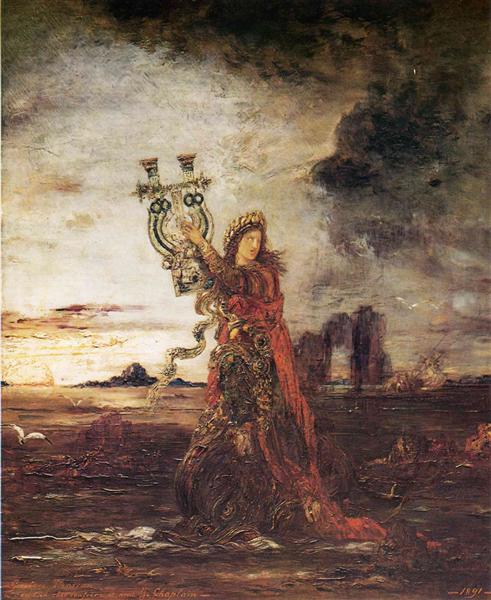Description
In the vast universe of symbolism, the work "Arion" of 1891, created by the masterful Gustave Moreau, stands as one of the most dazzling samples of this artistic movement. The canvas, in its magnificence, tells the legendary story of the Greek poet and musician Arion, whose talent in the zitara was so sublime that, thrown into the sea by greedy pirates, he was rescued by a delffin delighted by his music.
Moreau, known for his meticulous attention to detail and his style loaded with symbolism, perfectly captures this moment from classical mythology. The composition of painting It focuses the observer in the aristocratic figure of Arion, represented with a clothing of gold and blue tones, colors that highlight their nobility and its heavenly connection. Moreau does not spare in details: the fine jewels and fabrics that dress the poet imply not only his status, but also the symbolic wealth of the scene.
The dolphin, imposing and serene, acts as El Salvador de Arion in this composition. Moreau achieves a perfect symbiosis between man and animal, highlighting the harmony and mystical connection between them. The sea presents itself less stormy than expected, allowing in its serenity an almost dreamlike atmosphere. The colors of the water, which range between deep marine and blue green, contrast with the illuminated figure of the protagonist, intensifying the sensation of a miraculous rescue.
The light in Moreau's painting is subtle but effective. Mainly illuminates Arion, projecting a halo of divinity around the musician and suggesting that his talent has an almost supernatural quality. This artistic choice not only exalts the character, but also hints the favor of the gods, an implicit narrative in many of Moreau's works, where the divine and the human are intertwined in an inseparable way.
It is remarkable how Moreau's painting does not conform merely with telling Arion's story, but invites the viewer to immerse himself in a world of symbolism and allegory. The decorations in the arion suit and the intricate patterns in the body of the dolphin can be observed as symbols of beauty and rescue melody, both recurring concepts in the artistic production of Moreau.
Gustave Moreau, an undisputed precursor of symbolism, uses in "arion" a technique that amalgamates almost miniaturist detail with a pictorial style that invites contemplation and dream. The work does not seek realism, but the idealized and deeply psychological representation of its themes, creating a bridge towards the transcendental.
Compared to other works of the master, As "Gallant Sebastián" or "Jupiter and Sémele", "Arión" remains in the same line of symbolic complexity and visual wealth. All these works reflect the fascination of Moreau for the mystical and mythological, elements that he intertwines with mastery to take the viewer to a trip beyond the tangible.
In conclusion, "Arión" by Gustave Moreau is not only a pictorial representation of a Greek myth, but a deep exploration of the symbolism inherent in salvation, beauty and interconnection of the divine and the human. The work remains, to this day, a jewel of symbolism, reminding us of the ability of art to transcend the literal and enter the field of the eternally evocative.
KUADROS ©, a famous paint on your wall.
Hand-made oil painting reproductions, with the quality of professional artists and the distinctive seal of KUADROS ©.
Art reproduction service with satisfaction guarantee. If you are not completely satisfied with the replica of your painting, we refund your money 100%.

